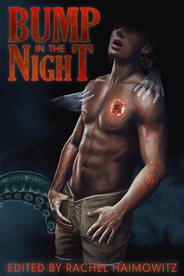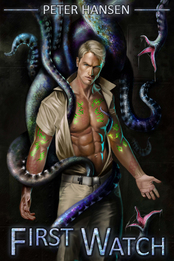One of my friends described "Sleeping with Ghosts" as a kind of reverse Dracula story -- where a man goes to the untamed lands beyond so-called civilization and, instead of finding a monster there, discovers that he is the monster within them. I think there's more than a grain of truth to that reading, even though the more conventional monsters take center stage. When I was building the world for "Sleeping with Ghosts," I was combing the Balkans and the Carpathians for creepy creatures and means to destroy them, from ill-born children who devour their families to the cold efficiency of iron spikes. There are superstitions in Greece and Bulgaria and Macedonia about how to keep children from devouring their families, or to recognize a human intelligence in a wolf's eyes, or how to know a witch in time to keep her from spiriting you away to Hell. The folklore of these lands is one in which anyone, even and especially your loved ones, might be a monster. While it's fun to take a mythology and replicate it, to build a culture where vampires or witches are real and follow a particular set of rules, it's also important to engage with the questions that a mythology asks of the people who believe in it. The theme of paranoia and ubiquitous monstrosity is what I set out to explore in "Sleeping with Ghosts," and I'd like to spend more time with it as I start writing a novel (novella?) set directly after it. "How far will we go to detect monsters before they can do harm, or to prevent monsters from coming into the world?" these projects ask. "Will we become monsters ourselves?" From the Callicantzaros page on Monstropedia: To prevent an infant of two mortal parents born during the proscribed Yule Tide season from becoming a callicantzaros, the infant was sometimes held feet down over a fire by one of the parents until the toenails were singed. Some people, apparently, were willing to go quite far indeed.
I'll be the first to admit, I'm a pretty terse writer. My short stories always run very short, and the review I get most often is, "I liked the premise, but I really needed more details." If I know the characters are in a room on an ice planet and one has a gun and the other doesn't, then sometimes, that's all I really need to know. At the other extreme, there's E.L. James, who will tell you exactly what her characters had for breakfast and what the vintage on the wine is and what her hero's cologne smells like. She spent around three paragraphs once just describing her heroine showering. (Here's a great recap of the 50SoG trilogy, if you're interested -- but fair warning, you will lose hours of your life to reading this and you will not get them back.) Her predecessor, Stephenie Meyer, has a similar tendency toward detail. At first I scoffed, but then my younger sister explained to me that when Twilight first came out, it was engrossing to her in part because she could empathize with the details of it. "Bella was doing the same science experiments I was doing, so I understood where she was coming from," she told me. A fascinating thought: that teenage girls were clamoring for these books not because they'd fallen for sparkly Edward Cullen, but because they, too, had studied mitosis. The detailed depiction of learning science, more than the gorgeous vampire, felt real and important and aroused their empathy. How much detail is enough detail is a matter of personal taste, of course, but since James and Meyer are now bazillionaires and I'm living below the poverty line, I figure they've got something to teach me. So I'd like to kick off a weekly or semi-weekly discussion feature on this blog by asking, "What details help you to engage with a book? What details help you to empathize with the characters?"
My tag for things set in the same universe as "Sleeping with Ghosts" is "Nothing Goes Right for Yordan Korvechi," which is about as accurate a tag as you're likely to find on the internet. This is not because he is an assassin; holy assassins are regarded as slightly creepy necessary evils in his world, rather like traveling dentists with switchblades. Neither is it because he's a priest, although that certainly means more people are looking to him to fix what goes wrong than would otherwise be the case. By and large he leads an unremarkable life, albeit one where he kills quite a lot of people.
No, I'm forced to believe that Yordan was simply born unlucky. In a world where cold iron wards off the creatures that prowl the forests, a world where soullessness has practical as well as theological consequences, it's odd that "luck" isn't a more prominent concept. Chance, now, chance is a thing; people roll the bones to wager away their wages there as often as they do here. Chance might mean it's your throat cut and not another's, in the cities where death is still infrequent enough to be novel. But luck, the idea that there is some guiding force in the universe that has reached down its hand with the express purpose of fucking up your day, is relatively unknown. There are gods of profit and gods of death, gods of the harvest and gods of the archive, but Lady Fortuna does not rank among them.
Make no mistake, though, Yordan Korvechi is not a lucky man. In "Sleeping with Ghosts," he sets out to commit a murder and instead finds himself solving one--and finding to his vast irritation that, for all his attempted professionalism, he is not ultimately the culprit. When next we join our plucky young priest, he will be attempting to take a seaside holiday with his boyfriend to recover from the death of a friend. Bragava is the perfect resort town for a man with grief to sort through: quiet, slow, and (most importantly) far, far away from anyone he knows.
Unfortunately, the sleepy city by the sea has roused itself from a long slumber and begun to boil with revolutionary sentiment, and Yordan doesn't even have a potholder to his name.
He was definitely planning to get laid more on this vacation.
*
Tune in periodically for more updates on how nothing goes right for Yordan Korvechi!
 After a long time away, I've returned to my recreational writing habit with two upcoming anthology publications. Both of these projects are exciting for me, because both potentially have novels attached, so expect a lot of wittering about minor characters and plot logic and the logistics of xenokink. "Deadline" in Tall, Dark, and Wriggly (more on that in the months to come!) is a science fictional story about interspecies politics, power plays, and hot tentacle dickings, which honestly you all should've expected if you know my body of work thus far. I must've been tentacle monstered out, though, because while "Sleeping with Ghosts" is being published in Bump in the Night--an erotic horror anthology with two tentacle sex stories--there is not a single tentacle to be found in it. You could call it a Grimmpunk religious murder mystery, if you were the kind of person who used words like "Grimmpunk," or you could call it an affair between the spirit and the flesh. If you wanted to throw in a lascivious wink at the end there, I wouldn't blame you.
In a land where travelers go to bed with cold iron close to hand and soulless children rip their mothers apart, Yordan Korvechi is a member of a religious order with one purpose: holy assassination. He gets more than he bargained for, though, when his Father Superior sends him on an urgent mission deep into the eastern hinterland. The target, Kardam Zavachi, is not yet ready to die--and as his hungry ghost returns to trouble Yordan's sleep, Yordan begins to realize that killing him was the easy part.
Excerpt available here.If Bump in the Night sounds like your kind of thing, you can pre-order right now. (Seriously, you want to pre-order this right now, because everyone who pre-orders gets the book two days early and is entered into a contest to win free books from Riptide for a year. If it weren't a breach of etiquette, I'd be pre-ordering under six different pseudonyms. Free books is a huge enticement for me.) So, to sum up, I'm back to erotic horror, tentacleporn, and space boyfriends. Apparently I haven't learned a thing from being away.
I know, you've all been missing my scintillating wit and tentacle porn -- I know I have. The writing I do in my free time is just about as fun as it gets, and the best part is sharing it with a community of readers and writers who will tell me which are the hot parts.
Unfortunately, it is writing I do in my free time, and I don't have as much of that these days as I'd like. Teaching's a demanding field; you'd think that since I have summers off, I'd be churning out about three books a week, but writing lesson plans and keeping up to date on my subject takes up a lot of my time. Teaching is also not a very lucrative field, so in the interest of paying rent, I'm working Ye Olde Summer Jobbe on top of prepping for fall.
What all this means is, you're probably not going to see much of me for a while. Think of it as the off season, and feel free to envision a training montage or three. Can't go wrong with a training montage.
Apparently, what happens when you do seventeenth-century literature and just HAPPEN to write tentacle porn is, people start linking you to Robert Herrick (note his bitchin' pornstache). I wish to express my satisfaction with this state of affairs and encourage you to continue. Text of Herrick's 'The Vine' below the jump!
 Allow me to deliver. :D Even in its early stages, I adored this cover for First Watch. It was beautiful -- it was lurid, in the best possible way. The palette reminds me of the picture at the conclusion of the black-and-white Picture of Dorian Gray; it speaks to the kind of compelling horror that fascinates even as it revolts. To say "the fascination of the abomination" would be trite, but it would be true. As an amateur artist myself, I know how hard it is to capture one's own mental image on paper. I can't even imagine how hard it is to capture someone else's -- but that's just what Roberto Quintero did here, more brightly and more vividly than I could've imagined. My hat's off to him.
... that has such people in it! I can tell I'm going to like you already.
Welcome to my corner of the internet. Mind where you step; there will be cats sprawled over the floor and piles of research material scattered everywhere, and neither the cats nor the papers like being disturbed. Sit down and have a cup of tea.
Crack open a book. Stay a while, if the story moves you. I'll keep the kettle on.
|


 RSS Feed
RSS Feed